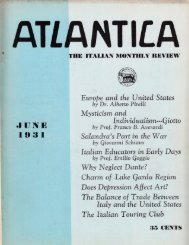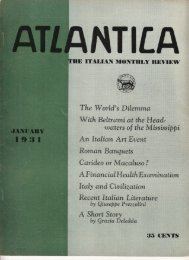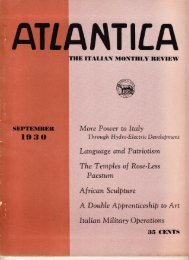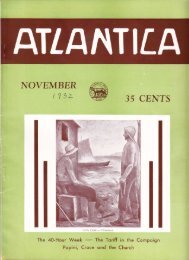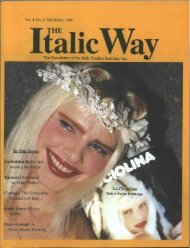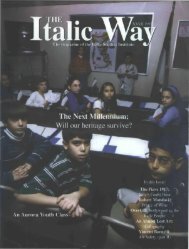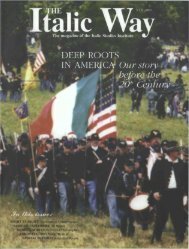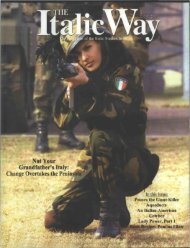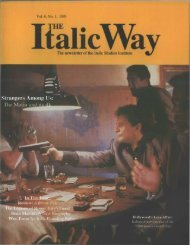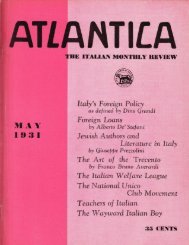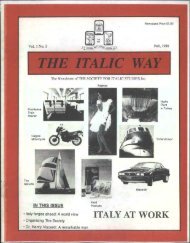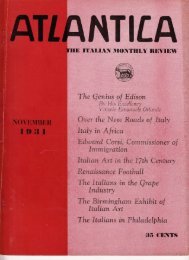Issue XXII - Italic Institute of America
Issue XXII - Italic Institute of America
Issue XXII - Italic Institute of America
You also want an ePaper? Increase the reach of your titles
YUMPU automatically turns print PDFs into web optimized ePapers that Google loves.
coast and their freedom fwther restricted by curfews andtravel limits. In San Francisco, just to cite a conspicuousexample, the parents <strong>of</strong> baseball legend Joe DiMaggio wereforbidden to travel more than five miles from home without apermit (DiMaggio Sr. was a fisherman). Even noted physicistEnrico Fermi, who contributed enormously to <strong>America</strong>'s development<strong>of</strong> the atomic bomb, had his travel restricted on theEast Coast and around Chicago. Others were penned up inQuonset huts and treated like prisoners <strong>of</strong> war. Noted teachers,actors and journalists in Italian settlements throughout<strong>America</strong> were branded "under suspicion," "subversive" or"disloyal."Joe Dl Maggio's parentswere subjected to curfewand travel restrictiondespite their son's fame.OVer 500,000 Italian-<strong>America</strong>nsserved In WW II whiletheir ethnic kin were consideredInternal enemies. Sgt.Anthony Basllone was amedal <strong>of</strong> honor winner wholater lost his life In combatA QUESTION OF LOGISTICSWhy did this happen? And why do we know so little aboutit?In the wake <strong>of</strong> the bombing <strong>of</strong> Pearl Harbor by Japan andthe subsequent declaration <strong>of</strong> war by the United States onJapan and its allies,ltaly and Germany, <strong>America</strong> went througha frenzy <strong>of</strong> bigotry in the guise <strong>of</strong> patriotism.People with links to Italy, Germany or Japan, no matterhow many years they had lived peacefully in the United States,suddenly were viewed in a hostile light.While it is widely known that Japanese <strong>America</strong>ns on theWest Coast were rounded up and interned in camps-in whattoday is rightly seen as an obscene trouncing <strong>of</strong> their Constitutionalrights-it is virtually a secret story that Italian Ameri·cans and Gennan <strong>America</strong>ns were victims <strong>of</strong> the same hysteria.The original intention <strong>of</strong> the military was to intern ~people <strong>of</strong> Italian, German or Japanese heritage, whether'--iiiiiiiiiiiiiiiixxn.iiiiiiiiiiiiiiiiiiiiiiiiiiii1994~iiiiiiiiiiiiiiiiiiiiiiiiiiiiiiiiiiiiiiiiiiiiiiiiiiiiiiiiiiiiiiiiiiiiiiiiiiiiiiiiiiiiiiiiiiiiiiiiiiiiiiiiiiiiiiiiiiil;;;;;;<strong>America</strong>n citizens or not T t tv-c~~e obvious that such a roundup was impossible. Moreover, nanonal politicians, includingPresident Roosevelt, thought better <strong>of</strong> antagonizing Italian<strong>America</strong>n voters in the East and Mid-WestSigniftcantly, Japanese <strong>America</strong>ns living in Hawaii, themost vulnerable U.S. territory, were left untouched simplybecause there were too many <strong>of</strong> them (one-third <strong>of</strong> the population)and they were too much involved in the island's economy.But in the Western states their number, about 100,000,and concentration were just right for internmentItalians, on the other hand. presented a logistical nightmare.They were dispersed throughout the country andwere not as racially distinctive as Japanese <strong>America</strong>ns.Moreover, Italian <strong>America</strong>ns had some political clout andpopularity. These were the days <strong>of</strong> New York City'sFiorello LaGuardia and baseball's Joe Di Maggio (MammaDiMaggio went so far as to take to the radio in a plea forcalm). And men like business tycoon A.P. Giannini (Bank<strong>of</strong> <strong>America</strong>) was himself a son <strong>of</strong> immigrants. But despitethe exemplary role-models and the disarming stereotypes <strong>of</strong>Chico Marx and Heney Armetta in <strong>America</strong>n cinema at thattime, Italians had been objects <strong>of</strong> fear and suspicionthroughout the 1930's. Unlike the Japanese <strong>America</strong>ns, the<strong>Italic</strong> community expressed much enthusiasm for Mussoliniand the Fascist regime. In 1942, their ethnic pridewould return to haunt them.HURT&SHAMEThe reason we know so liuie <strong>of</strong> what happened to Italiansand Germans is tw<strong>of</strong>old. On the one hand, the federal, state,and local governments were not proud <strong>of</strong> what they did.Many records were destroyed, actions were covered up ordenied and later generations <strong>of</strong> bureaucrats pleaded ignorance,<strong>of</strong>ten quite legitimately since little documentationDON'T SPEAK THEENEMY'S LANGUAGE!Just as the German-<strong>America</strong>n Image suffered In theHun scare <strong>of</strong> the First World War, the Italian languageand culture was dealt a mortal blow with World War IIposters such as this.3iiiiiiiiiiii;;;;;;;;;;;;;iiiiiiiiiiiiiiiiiiiiiiiiiiiiiiiiiiii= The 1 talic Way;;;;;;;;;;;;;;;



